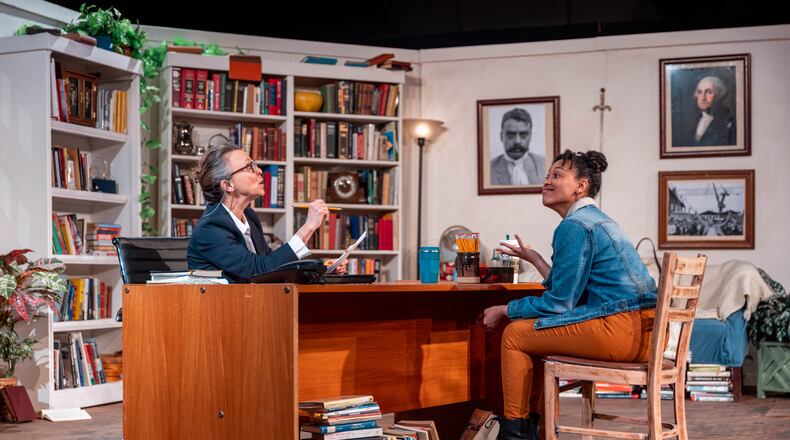This story was originally published by ArtsATL.
Debate is a spectator sport. Some playwrights understand that sometimes all you need to create compelling theater is to put two well-matched foes in a good argument.
“The Niceties,” a 2019 play by Eleanor Burgess running at Stage Door Theatre in Dunwoody through April 2, creates some pretty compelling theater by putting two people with opposing views alone in a room together — then letting the pressure cook. In the vein of David Mamet’s “Oleanna” or Loy A. Webb’s “The Light,” this play is nearly as satisfying, though it doesn’t give our characters’ perspectives equal weight on their central argument.
Credit: Matthew Bish
Credit: Matthew Bish
Here, set in March 2016 at an unnamed New England university, Janine, a history professor played by Natalie Karp, is advising Zoe, a student played by Christalynn Hamer, during office hours about her paper on the American Revolution. At first, Janine’s advice sticks to surface-level critique of Zoe’s writing. But then Zoe asks Janine what sort of grade the paper would merit, and Janine attacks the central premise of Zoe’s thesis: that the Revolutionary War took the moderate form it did because of the existence of slavery, saying that no available research backs that assertion.
Janine tells Zoe her grade will be lowered unless the student finds concrete book research to support such an argument, yet Zoe counters that finding the voices of oppressed, overlooked populations intentionally excluded from history books is not a fair task.
Janine doesn’t really have a thesis that counters Zoe’s, though Janine gives the Founding Fathers and the premise of democracy a lot more hero worship than her student does. Janine does have bias against internet research, as well as other unconscious biases. Zoe, meanwhile, has her own biases.
The nuanced, layered differences between the characters and their power dynamic are at the heart of the play. There is a racial difference between the characters, for Zoe is Black and Janine is white and of Polish descent. There are also class divides, a generation gap, gender politics and sexual orientation factors at play. There is even a technology bias. Though both characters are politically liberal, they cannot seem to connect or fully grasp what the other is saying.
There are moments throughout the play when neither is right in her approach or tactics, though the playwright does seem to give Zoe’s argument the advantage over Janine. It leaves the play feeling a bit unevenly matched, though its construction and dialogue are top-notch.
Plus, the script is full of fascinating ideas and brilliant touches, making pre-pandemic, pre-Trump Obama era 2016 feel about a million years ago, ideologically.
Credit: Matthew Bish
Credit: Matthew Bish
Karp delivers a strong performance as Janine — buttoned-up, professional, powerful yet casually condescending toward her student. The play takes place on her turf, surrounded by her books and portraits she’s selected. Karp plays Janine with a spark of optimism, for she believes the coming election of Hillary Clinton will show that the gradual pace of American progress does work. Throughout the first act, Karp hints at her character’s sexuality, shows her mild body aches and back pains and also portrays dozens of microaggressions so that they can be noted by the audience as well as by Zoe.
Hamer’s work as Zoe is particularly impressive; the actress said during a post-show talkback that she had little prior stage experience. It’s a physical performance — we see her bristle and squirm in reaction to her professor, keeping a mental inventory of missteps. Zoe is full of fire, yet not always tactful, diplomatic or forgiving.
The script is a beast, nearly 70 pages of uninterrupted dialogue about complex academia, and the cast performs it admirably.
The first half of the play is a pressure cooker. The second half simmers in comparison, never quite reaching the same intensity, but it makes for a satisfying experience. The props and costumes, designed by Faye Manselle and Lilly Baxley, highlight the differences between the women in subtle ways throughout the play, even as their relationship to one another changes.
Candy McLellan directs “The Niceties,” and McLellan’s own performance in another two-person show, “Bright Half Life” at Theatrical Outfit last year, seems to echo here in the performers’ blocking and differences of manner.
“The Niceties,” despite its title, does not spend a lot of time being polite. It is an intense, very interesting show.
THEATER REVIEW
“The Niceties”
Through April 2. $15-$35. Stage Door Players at Dunwoody Cultural Arts Center, 5339 Chamblee Dunwoody Road, Dunwoody. 770-396-1726, stagedoortheatrega.org.
::
Benjamin Carr, a member of the American Theatre Critics Association, is an arts journalist and critic who has contributed to ArtsATL since 2019. His plays have been produced at The Vineyard Theatre in Manhattan, as part of the Samuel French Off-Off Broadway Short Play Festival, and the Center for Puppetry Arts. His novel Impacted was published by The Story Plant in 2021.
Credit: ArtsATL
Credit: ArtsATL
MEET OUR PARTNER
ArtsATL (www.artsatl.org), is a nonprofit organization that plays a critical role in educating and informing audiences about metro Atlanta’s arts and culture. Founded in 2009, ArtsATL’s goal is to help build a sustainable arts community contributing to the economic and cultural health of the city.
If you have any questions about this partnership or others, please contact Senior Manager of Partnerships Nicole Williams at nicole.williams@ajc.com.
About the Author
Keep Reading
The Latest
Featured





